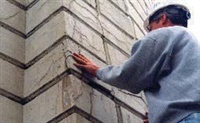Art and Science of Matching Historic Concrete
Total Credits: 1 PDH
- Categories:
- Webinar
- Presenter:
- Amy Woods, P.E.
- Duration:
- 1 Hour, 20 Minutes
- Format:
- Audio and Video
- License:
- Access for 6 month(s) after purchase.
Description
Matching concrete sounds simple, but there are many factors that affect color, texture, and aesthetics. There is often a challenge with using modern cementitious materials for matching older and historically manufactured cements. Whether your project is historic or contemporary, this presentation will outline materials and methodology that are important to understand when concrete matching is important. With many mid-century buildings coming of repair age, this is a critical time for understanding these concepts. The presentation will include the fundamentals of concrete materials, how cementitious materials affect concrete color, how to use color measurement technology in developing a color match mix design, how aggregate exposure affects aesthetic perception, and other helpful tips when it comes to matching concrete for durable and aesthetic results. Regionally available materials will vary, but the methodology for color matching durable repairs is fundamentally the same. Craftworkers that are trained and educated in concrete matching are assets to project teams and play a significant role in successful historic concrete repair projects.
Learning Objectives
- Learn the background and basics of concrete and cement history.
- Understand manufacturing processes and how it affects cement color.
- Understand current cementitious materials and pozzolans that are available to use to mimic old cements.
- Learn the methodology for approaching and achieving durable historic concrete repairs that match aesthetically.
Handouts
| Presentation Slides (2.7 MB) | 42 Pages | Available after Registration |
Presenter

Amy Woods, P.E. Related Seminars and Products
Principal Engineer
Braun Intertec Corporation
Amy Lamb Woods, P.E. is the Director of Technical Education with the International Masonry Institute (IMI) and a licensed Professional Engineer in multiple states. Her background combines architecture, historic preservation, and civil engineering materials. Ms. Woods has over 20 years of experience in the field of forensic engineering of building materials, both historic and contemporary structures. Her experience includes facade and failure investigations with materials such as brick masonry, terra cotta, stone, concrete, terrazzo, and stucco. Her primary interest is with projects involving the investigation and repair of historic masonry and concrete materials. From the University of Illinois at Urbana-Champaign, Ms. Woods obtained a BS in Architecture, MA in Architecture Historic Preservation, and an MS in Civil Engineering Building Materials with a focus on cement chemistry. She is a Board member for the Association for Preservation Technology International (APT), past Board member of the International Concrete Repair Institute (ICRI) Seattle and Chicago chapters, and founder of Women in Restoration & Engineering (WiRE).
